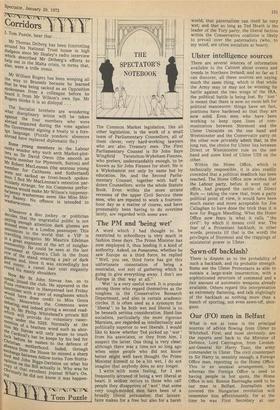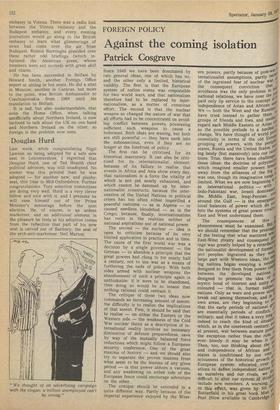The Common Market legislation, like all other legislation, is the
work of a small team of Parliamentary Counsellors, all of them clever, very hard-working lawyers Who are also Treasury men. The First Parliamentary Counsel is Sir John Saye Wingfield Twistelton-Wykeham-Fiennes, who prefers, understandably enough, to be known as Sir John Fiennes for short. He is a Wykehamist not only by name but by education. He, and the Second Parliamentary Counsel, together with half a dozen Counsellors, write the whole Statute Book. Even within the more arcane recesses of the upper Civil Service these men, who are reputed to work a fourteen hour day as a matter of course, and have presumably been having to do overtime lately, are regarded with some awe.
The PM and 'being wet
A word which I had thought to be restricted to schoolboys is very much in fashion these days. The Prime Minister has now employed it, thus lending it a kind of authority. Asked, on Panorama, whether he saw Europe as a third force, he replied "Well, you see, third force has got this unfortunate connotation of being a neutralist, wet sort of gathering which is going to give everything away. I don't see Europe in that way at all." ' Wet ' is a very useful word. It is popular among those who regard themselves as the toughies in the Conservative Research Department, and also in certain academic circles. It is often used as a synonym for ' liberal ': to be both wet and liberal is to be beneath serious consideration. Hard-line socialists, particularly the more rigorous Marxists, are regarded as intellectually and politically superior to wet liberals. I would like to know whether Ted picked up 'wet' from his associates, or they from him. I suspect the latter. One thing is very clear: although there was a time not so long ago when some people who did not know better might well have thought the Prime Minister himself to be a bit wet, I do not imagine that anybody does so any longer.
I write with some feeling, for I am frequently accused of being a wet liberal at heart. It seldom occurs to those who call people they disapprove of 'wet' that some very tough-minded men have been of a broadly liberal persuasion; that laissezfaire makes for a free but also for a harsh world; that paternalism can itself be very wet; and that so long as Ted Heath is the leader of the Tory party, the liberal faction within the Conservative coalition is likely to prevail over the paternalists (who, to my mind, are often socialists at heart).
Ulster intelligence sources
There are several sources of information available to the Cabinet about events and trends in Northern Ireland; and so far as I can discover, all these sources are saying much the same thing, which is that while the Army may or may not be winning its battle against the two wings of the IRA, the political battle is being lost. By lost is meant that there is now no room left for political manoeuvre: things have set fast, positions have hardened so that they are now solid. Even men who have been working to keep open lines of com munication between Stormont and the Ulster Unionists on the one hand and Westminster and the Conservativ party on the other now privately admit that, in the long run, the choice for Ulster lies between Direct or Westminster rule on the one hand and some kind of Ulster UDI on the other.
Within the Home Office, which is technically responsible, it is also readily conceded that a political deadlock has been reached. The Home Office now wishes that the Labour party, before it went out of office, had grasped the nettle of Direct Rule — taking the view that, from a party political point of view, it would have been much easier and more acceptable for Jim Callaghan to have done the trick than it is now for Reggie Maudlin& What the Home Office now fears is what it calls the civil": by which it means civil war. The fear of a Protestant backlash, in other words, protects (if that is the word) the privileges of Stormont and the trappings of ministerial power in Ulster.
Sawn-off backlash?
There is dispute as to the probability of such a backlash, and its probable strength. Some see the Ulster Protestants as able to sustain a large-scale insurrection, with a sophisticated structure of command and a fair amount of automatic weapons already available. Others regard this interpretation as extremely flattering, and talk slightingly of the backlash as nothing more than a bunch of sporting, not even sawn-off, shotguns.
Our (FO) men in Belfast
What is not at issue is the principal sources of advice flowing from Ulster to Whitehall. First, and most obviously, are the reports sent back to the Minister of Defence, Lord Carrington, from Lieutenant-General Sir Harry Tuzo, the army commander in Ulster. The civil counterpart to Sir Harry is, sensibly enough, a Foreign Office man, reporting to the Home Office. This is an unusual arrangement, but whereas the Foreign Office is used to having people in hot spots, the Home Office is not. Ronnie Burroughs used to be our man in Belfast. Journalists who covered the Hungarian revolution will remember him affectionately, for at the time he was First Secretary at our embassy in Vienna. There was a radio link between the Vienna embassy and the Budapest embassy, and every evening journalists would go along to the British embassy to learn what glimmerings of news had come over the air from Budapest. Ronnie Burroughs presided over these rather odd briefings (which infuriated the American press, whose members were not invited) with great skill and charm.
He has been succeeded in Belfast by Howard Smith, another foreign Office expert at sitting in hot seats. He did a stint in Moscow, another in Caracas, but more to the point, was British Ambassador to Czechoslovakia from 1968 until his translation to Belfast. It is sad, but also understandable, that even the Home Office, when talking unofficially about Northern Ireland, is now inclined to talk about the UK on one hand and Northern Ireland on the other, so foreign is the problem now seen.
Douglas Hurd
Last week, while congratulating Nigel Lawson on being adopted for a safe new seat in Leicestershire, I regretted that Douglas Hurd, one of Ted Heath's chief political advisors, was still unadopted. No sooner was this printed than he was adopted — for another new, and plushy, seat, this time in Mid-Oxfordshire. Further congratulations. Tory selection committees are doing very well. Hurd is a very clever fellow and nice with it, and I presume he will ease himself out of the Prime Minister's entourage before the next election. He, of course, is an ardent marketeer, and an additional element in the pleasure he feels at his adoption comes from the reflection that part of his new seat is carved out of Banbury, the seat of the arch-anti-marketeer, Neil Marten.











































 Previous page
Previous page